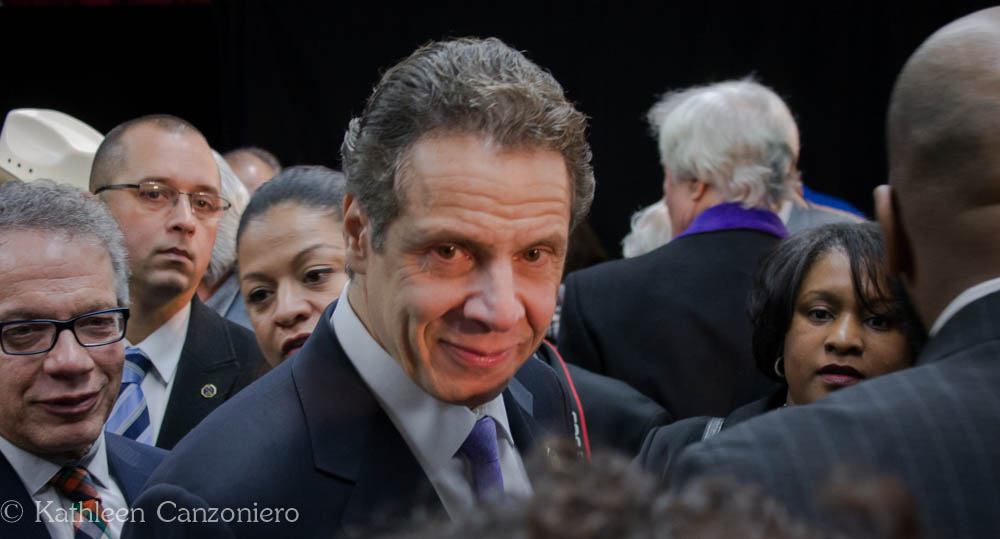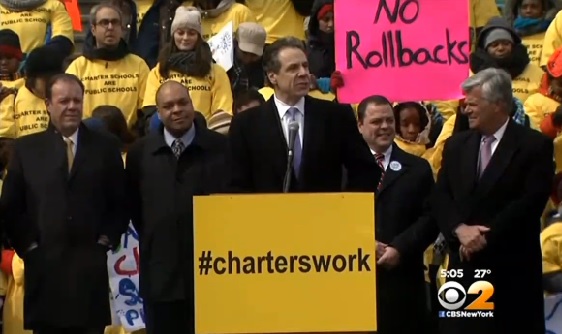Currently, Mayor Bill de Blasio and NY State Governor Andrew Cuomo are divided on the issue of basing a teacher’s evaluation on standardized testing scores. During the State of the State address, Governor Cuomo proposed various educational reforms involving tougher teacher evaluations, more charter schools, and changes in tenure. In this plan, 50% of the teacher’s evaluation will be reliant on the scores students received on state exams while the other 50% will be based on independent observation. A teacher that fails to prove effective for two evaluations would then be removed. Schools that are considered failing would be then handled by non-profits or turnaround experts to create “community schools”. If the reforms are implemented, Cuomo promised to raise the education budget from $377 million to $1.1 billion.
Mayor de Blasio’s $150 million plan will designate 94 of the city’s most troubled schools as “Renewal Schools” based on a list of criteria including: low four-year graduation rates for high schools and poor test scores for middle and elementary schools. Students at those schools will receive an extra hour of instructional time each day, teachers will have extra professional training, and the schools will be encouraged to offer summer school. Additionally, principals and superintendents of failing schools will have to explain to senior Department of Education officials what steps they are taking to turn around these schools. In regards to using standardized testing as part of teacher’s evaluations, the Mayor’s plan will only weigh the test-score gains at 20%.
As an educator for 48 years, I taught general and special education students, served as an education evaluator, supervisor, and as an administrator for the Committee for Preschool Special Education in Community School District #11. Through all those years I have never been a supporter of standardized tests for children. From my experience, standardized tests never gave a true picture of the students abilities, the school, or the teachers. We as adults know the stress associated with tests and that stress is much worse on children.
Also as a result of basing teacher evaluations heavily on standardized tests scores, teachers will spend most of their class time with test preparation. Test preparation is not teaching as it lacks teaching skills to students that go beyond test taking. A study done on the 1992 National Assessment of Educational Progress found that four different variables accounted for 89% of the differences in state scores. These variables were: number of parents living at home, parents’ educational background, type of community, and poverty rate. This shows that that achievement is all too often determined by the socioeconomic status of the student as well as other factors that are not taken into consideration in standardized tests.
In 2013, the Massachusetts Institute of Technology (MIT), Harvard University and Brown University conducted a study of 1,400 eighth grade students in the Boston public school system from charter, traditional, and exam schools. They found that, even though some schools successfully raised their students’ scores on the Massachusetts Comprehensive Assessment System state test, that improvement was not associated with an increase in students’ “fluid intelligence.” Fluid intelligence is the use of logical thinking and problem solving while “crystallized intelligence” is the ability to access information from long-term memory. According to the study, raising test scores only raises the students “crystallized intelligence”.
Results from standardized tests are not how educators should be evaluated but, instead, a multiple measured approach should be considered to evaluate the efficacy of a teacher’s performance through using: principal and peer observations, student and family feedback, and professional development. Students need to be critical thinkers and teachers need to have the time to teach them how to think, analyze and make decisions. The best predictor of a child’s prospects for success as a student and a good quality of life after school is the student’s condition when he or she arrives in the classroom and how the student is taught.
Let us keep in mind New York State should honor the state’s obligation to fund school districts at a level adequate for a sound basic education. Since 2007, the state legislature and a series of governors have ignored the New York State Court of Appeals’ ruling to direct several billions of dollars of funding annually to the state’s neediest school districts.
I feel that those schools which are in jeopardy should have an IEP. Similar to the IEP issued for students with special needs this IEP would have weaknesses in the school and goals possibly on a two month or three month basis. Methodology would be stated to improve the deficits, possibly through conferences where strategies could be discussed and implemented.

















Follow Us